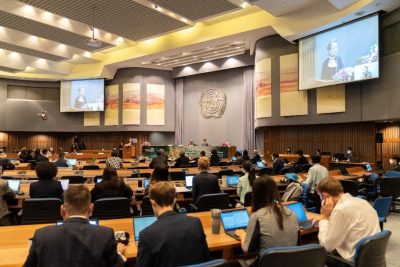Bangkok (Press Release by ESCAP, Dec 1, 2022); Ministers and high-level officials renewed commitments from Asia-Pacific countries

to boost regional cooperation in climate action, sustainable urban development, the protection of ecosystems and oceans, and implementing environmental rights principles; all critical elements to achieve the common goal of a healthy environment
The ministerial declaration on “Protecting our planet through regional cooperation and solidarity in Asia and the Pacific” was endorsed at the close of the seventh session of the Committee on Environment and Development convened this week by the United Nations Economic and Social Commission for Asia and the Pacific (ESCAP).
The declaration also includes a regional action programme on air pollution to build momentum for stronger science-based and policy-oriented cooperation to improve air quality management, including through better air quality standards, open data sharing, exchange of best practices and capacity building.
“The challenges are serious, but I believe that the Asia-Pacific region has great potential to show leadership in building a sustainable future by building on our strong scientific and technological capacity,” said Armida Salsiah Alisjahbana, United Nations Under-Secretary-General and Executive Secretary of ESCAP.
Discussions at the high-level meeting also focused on the future of our ocean, integrating recommendations made during the Asia-Pacific Day for the Ocean celebrated on 30 November, as well as on One Health, and the importance of a regional framework for environmental access rights.
“I wish to recognize that the delegates all acknowledged the critical role that regional cooperation plays in solving complex environmental challenges, and we need to act in unison through multilateralism,” said Amenatave V. Yauvoli, Ambassador and Permanent Representative of Fiji to ESCAP and Chair of the senior officials segment.
Several partnership events shed light on new environmental initiatives based on cooperation and solidarity, ranging from a new air quality management framework and the promotion of a regional approach to respond to climate-related mobility in the Pacific to integrated climate action for low-carbon and resilient cities.
ESCAP also launched its flagship report on the state of the environment in Asia and the Pacific, which highlights three critical environmental challenges and identifies opportunities for concrete regional action.
Asia and the Pacific accounts for over 55 per cent of global greenhouse gas emissions, having increased by about 20 per cent between 2010 and 2022. The region also sees the most rapid and serious decline in biodiversity-related ecosystem services, is responsible for 81 per cent of global ocean plastics and nearly 90 per cent of its population regularly breathe air considered by the WHO to be unsafe. This is compounded by rapid urbanization trends, with over half of its population living in cities and urban areas.
Only 24 countries in the region recognize the right to a healthy environment in their constitutional provisions and 17 countries still do not have any constitutional or legal recognition of this right. Furthermore, despite a series of announcements from countries to reach net zero emissions by mid-century, current ambitions as set out in nationally determined contributions fall short of what is needed to reach the Paris Agreement targets.
The bi-annual Committee was attended by Say Samal, Minister of Environment of Cambodia; Semi Koroilavesau, Minister for Fisheries of Fiji; Bat-Ulzii Bat-Erdene, Minister of Environment and Tourism of Mongolia; and Laauli Leuatea Polataivao Fosi, Minister of Agriculture and Fisheries of Samoa; along with several other senior officials and stakeholders.
Further on November 11, 2022, Asia and the Pacific is a dynamic region and has made significant progress to improve the health and well-being of its population by lifting billions of people out of poverty.
However, economic growth has been based on unsustainable models of development, leading to the region accounting for more than half of global greenhouse gas emissions and two-thirds of premature death, due to air pollution, and causing a quarter of endemic species in the region to face high risk of extinction. If business continues as usual, the ongoing deterioration of our environment will exacerbate risks and vulnerabilities, potentially causing irreversible environmental change.
Meanwhile, it is encouraging to have the majority of Asian and Pacific countries already announcing goals to achieve carbon neutrality by mid-century, and many countries have developed detailed plans and strategies. Central to a carbon-neutral society is to phase out the use of fossil fuels and to fully utilize the potential of nature-based solutions to mitigate carbon dioxide emissions. This will lead to significant co-benefits to climate action safeguarding ecosystems and biodiversity, tackling the root cause of air pollution and making cities more liveable and sustainable. The transition is a race against time, considering the trend of global temperature rise and the region’s high vulnerability to climate change. To win in this race, Asia and the Pacific needs to strengthen regional cooperation and solidarity based on a shared vision. In line with national goals and aspiration for carbon neutrality, regional cooperation could support the implementation of long-term, low-emission development strategies through sharing knowledge and technologies, and facilitating partnership programmes.
Taking the lessons from the COVID-19 pandemic and other zoonotic diseases, the region needs to enhance joint efforts to protect and safeguard the health of ecosystems, including the marine ecosystem, with the “One-Health” approach, managing relations between the health of humans and animals and the functions of ecosystems. Regional cooperation needs to include the conservation and sustainable use of marine biodiversity beyond national jurisdictions, and consider the interlinkage of the marine ecosystem and climate change.
For more information: https://www.unescap.org/events/2022/ced7




